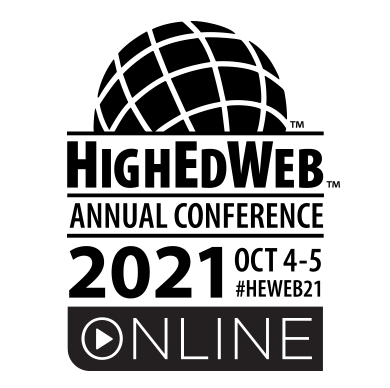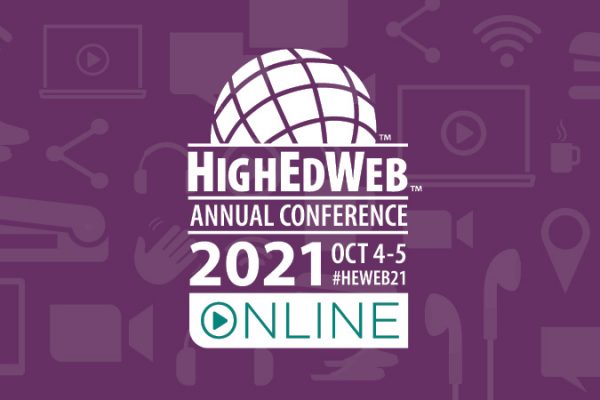
The deadline for submitting a speaking proposal for the always-awesome HighEdWeb annual conference is almost here: Monday, April 19! This year’s conference unfolds online on Oct. 4 and 5, but it can’t happen without people sharing your time and expertise.
You can submit a 45-minute proposal (pre-recorded, with a live Q&A) or an energetic 10-minute lightning (also pre-recorded, but 22.2 percent as long) or an interactive poster session.
Three great avenues just looking for your ideas.
But hang on, why should you present at HighEdWeb? We knew you might ask, so we posed some questions to that effect to Lori Packer, conference program chair and director of social media for the University of Rochester.
Link: Why should somebody submit a speaking proposal?
Lori: The HighEdWeb audience is one of the most supportive and welcoming that there is. Many of us work in small teams or teams of one. Many of us don’t have the kinds of resources we wish we had. Everybody wants to learn, wants to find solutions to issues and projects they’re facing, wants to pick up new ideas and new inspiration. So when you present at HighEdWeb, everyone is very eager to hear what you have to say, to understand what you’ve learned and how you’ve tackled a challenge that they are also facing. There is a real sense of sharing and of gratitude when we all get together to help each other.
It’s that audience that brings returning speakers back to HighEdWeb, but it also supports and encourages new presenters. Most years, around half of the speakers are presenting at HighEdWeb for the first time, and for many, it’s their first conference presentation ever! So whether you are a conference veteran or a first-timer, you should give HighEdWeb a go.
Link: With HighEdWeb happening in a virtual form, do you think this can help the ability of people to contribute and/or to the creativity they can put into it?
Lori: The annual conference is all online again this year. We’ll be asking speakers again to pre-record their presentations, and then the sessions will be followed by a live Q&A with the conference attendees. So for potential speakers who maybe are nervous about the idea of standing on a stage and speaking to a room full of people, this online format is a great way to try conference speaking in a more comfortable way.
One thing that I noticed happening last year at the online conference, that I thought was pretty fun and creative, was that speakers were able to watch themselves present. They could watch the pre-recorded video they made of their presentation along with the rest of the attendees, and during the session they could participate in the conference chat, asking and answering questions, getting to know more of the attendees, making jokes and having conversations that could then carry on in the real-time chat once the pre-recorded session was over. It was kind of cool.
Link: Any other helpful advice?
Lori: The HighEdWeb conference covers all aspects of web and digital work in higher education. You’ll find presentations on social media, accessibility, front-end and back-end web development, user experience, content strategy, project management, online learning, design and more.
Presenters work in IT or web services offices, marketing and communications, student affairs, advancement, alumni relations, libraries, and agencies or vendors supporting higher ed. Each year, we look for presentations that cover the same broad array of needs and of skillsets as our attendees.
So if your proposal isn’t accepted, please don’t be discouraged. But also, don’t count yourself out before you give it a try! You never know: that small thing you’re proud of, or that big idea you’ve been thinking? That could be just what your fellow web professionals needed to hear.
To learn more or to join the speaking party, visit the proposal submission webpage.

